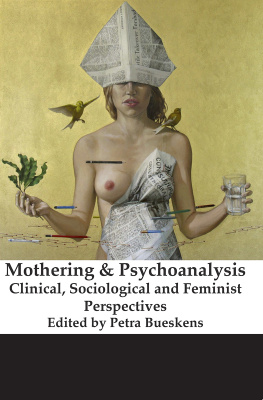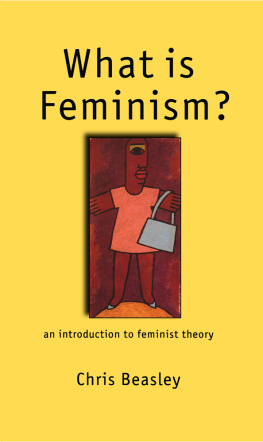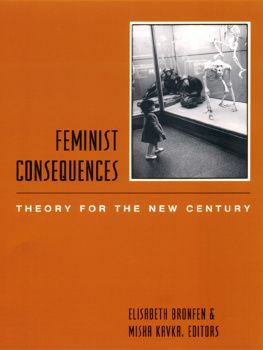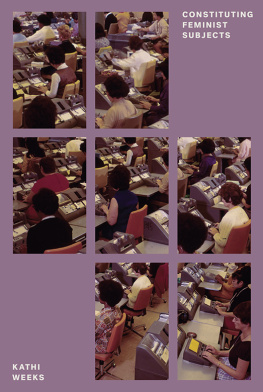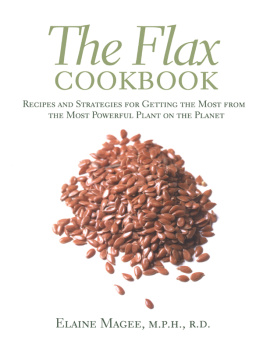ROUTLEDGE LIBRARY EDITIONS:
FEMINIST THEORY
DISPUTED SUBJECTS
DISPUTED SUBJECTS
Essays on psychoanalysis, politics and
philosophy
JANE FLAX
Volume 5
First published in 1993
This edition first published in 2013
by Routledge
2 Park Square, Milton Park, Abingdon, Oxon, OX14 4RN
Simultaneously published in the USA and Canada
by Routledge
711 Third Avenue, New York, NY 10017
Routledge is an imprint of the Taylor & Francis Group, an informa business
1993 Routledge
All rights reserved. No part of this book may be reprinted or reproduced or utilised in any form or by any electronic, mechanical, or other means, now known or hereafter invented, including photocopying and recording, or in any information storage or retrieval system, without permission in writing from the publishers.
Trademark notice: Product or corporate names may be trademarks or registered trademarks, and are used only for identification and explanation without intent to infringe.
British Library Cataloguing in Publication Data
A catalogue record for this book is available from the British Library
ISBN: 978-0-415-53401-7 (Set)
eISBN: 978-0-203-08796-1 (Set)
ISBN: 978-0-415-63707-7 (Volume 5)
eISBN: 978-0-203-08481-6 (Volume 5)
Publisher's Note
The publisher has gone to great lengths to ensure the quality of this reprint but points out that some imperfections in the original copies may be apparent.
Disclaimer
The publisher has made every effort to trace copyright holders and would welcome correspondence from those they have been unable to trace.
disputed
essays on
psychoanalysis,
subjects
politics and
philosophy
disputed
essays on
psychoanalysis,
subjects
politics and
philosophy
Routledge New York & London
Published in 1993 by
Routledge
29 West 35th Street
New York, NY 10001
Published in Great Britain by
Routledge
11 New Fetter Lane
London EC4P 4EE
Copy 1993 by Routledge
Printed in the United States of America on acid-free paper.
All rights reserved. No part of this book may be reprinted or reproduced or utilized in any form or by any electronic, mechanical or other means, now known or hereafter invented, including photocopying and. recording, or in any information storage or retrieval system, without permission in writing from the publishers.
Library of Congress Cataloging-in-Publication Data
Flax, Jane.
Disputed subjects : essays on psychoanalysis, politics, and philosophy / Jane Flax.
p. cm.
Includes bibliographical references and index.
ISBN 0-415-90789-6. - ISBN 0-415-90790-X (pbk.)
1. Feminist theory. 2. Psychoanalysis and feminism. 3. Postmodernism. 4. Philosophy, Modern 20th century. I. Title.
HQ1190.F59 1993
305.4201- dc20
93-15321
CIP
British Library Cataloguing-in-Publication Data also available.
This book is dedicated to the memories of Audre Lorde and Dorothy Dinner stein, in gratitude for their hard lessons and unrelenting integrity; and to Gabe and Fred for simple gifts, the most difficult to receive.
C ONTENTS
E PIGRAPHS
There are times in life when the question of knowing if one can think differently than one thinks and perceive differently than one sees is absolutely necessary if one is to go on looking and reflecting at all.
People will say, perhaps, that these games with oneself need only go on behind the scenes; that they are, at best, part of those labors of preparation that efface themselves when they have had their effects. But what, then, is philosophy todayphilosophical activity, I meanif not the critical labor of thought upon itself? And if it does not consist, in place of legitimating what one already knows, in undertaking to know how, and up to what limit, it would be possible to think differently?
Michel Foucault
The further one goes, the more possibilities there are, if you keep your eyes open and your mind not fixedthe mind that so often says, Well, that shouldn't be.
Merce Cunningham
We do not know, when a man dies, what has come to pass. We know only: he has left us. We depend upon his works, but we know that the works do not need us. They are what the one who dies leaves in the worldthe world that was there before he came and which remains when he has gone. What will become of them depends on the way of the world. But the simple fact that these books were once a lived life, this fact does not go directly into the world or remain safe from forgetfulness. That about a man which is most impermanent and also perhaps most great, his spoken word and his unique comportment, that dies with him and thus needs us; needs us who think of him. Such thinking brings us to a relationship with the dead one, out of which, then conversation about him springs and sounds again in the world. A relationship with the dead onethis must be learned
Hannah Arendt
P REFACE
The essays in this volume were written in response to questions about my last book, Thinking Fragments.1 In that book I created conversations between psychoanalytic, feminist, and postmodernist theorizing. There were several purposes for these conversations. I wanted to illuminate the strengths and weaknesses of a variety of theories and to show what each alone and conversations between them could contribute to understanding contemporary Western cultures. I also intended to explore and practice alternatives to the classic truth-enunciating mode of Western philosophy.
These conversations introduced as many questions as answers. I have not acquired any better answers, but I can offer some new contributions to my old conversation topics. These topics include knowledge, power, subjectivity, gender, justice, and responsibility. I continue to track the connections and conflicts within and among these topics and to pursue discourses that elucidate their meanings.
The previous conversations also generated many responses. Readers have challenged me with several claims. These include: postmodernists are necessarily politically irresponsible nihilists; they can make no contributions to useful notions of subjectivity; psychoanalysts must maintain allegiance to a unitary notion of a core self; and successful struggles against male dominance require a solid, empirical, and collective sense of female subjectivity. As my responses here indicate, I have not yet been convinced by these arguments. They appear to rely on unproductively flawed assumptions about subjectivity, knowledge, gender, justice, and responsibility.
In the first essay, Minerva's Owl, I analyze my continuing obsession with these topics. This essay works on at least two levels. It is an exercise in contingent autobiographya narrative that is resistant to and critical of assumptions that traditionally inform its genre. However, it is also an attempt to place my intellectual moves in personal, theoretical, and political contexts and to reflect upon the empowering and constricting aspects of these contexts and moves. I think about paths that appear to be irrevocably barred and others whose seductions are a recurrent danger. A commentator on an earlier version correctly pointed out its pervasive sense of nostalgia. It is full of nostalgia in Milos Kundera's sensea mixture of regret, longing, and desire for objects irretrievably lost but powerfully present in their absence.2


